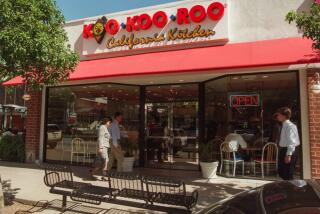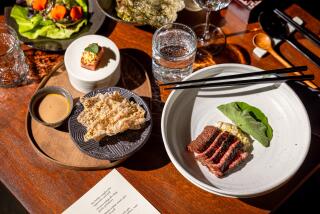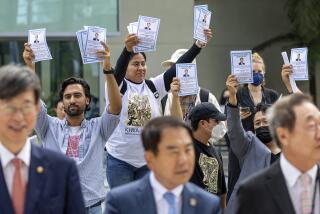Iacocca Named Acting Chairman of Koo Koo Roo
Koo Koo Roo Inc. named turnaround specialist Lee Iacocca as acting chairman Monday, prompting a trading surge that nearly doubled the stock price of the troubled Los Angeles-based restaurant chain.
Iacocca, who steered Chrysler Corp. away from bankruptcy in the early 1980s, will replace Kenneth Berg, who recently had open-heart surgery and resigned. Koo Koo Roo currently operates 52 restaurants in California, Las Vegas, Florida and Washington, D.C.
Iacocca and Bill Allen, chief executive, will immediately begin a “major restructuring” that includes cutting corporate staff, closing three Koo Koo Roos in Washington, D.C., and selling unrelated businesses.
“We decided to implement a new business strategy focusing on our core assets,” said Allen, a former Marriott executive who became CEO of Koo Koo Roo early this month. “We will pursue our business objectives with clear purpose and vigor as we move into 1998.”
The restructuring is the most substantial recovery attempt by Koo Koo Roo, which has yet to post a profit in this decade despite the popularity of its healthful flame-broiled chicken and vegetable side dishes.
Instead, Koo Koo Roo has racked up more than $35 million in losses since Berg began an aggressive, but seemingly ill-conceived expansion plan in 1990 marked by sudden restaurant openings and closings and ill-timed ventures into unrelated lines of business.
Koo Koo Roo in recent years bought the Color Me Mine chain of do-it-yourself pottery shops and Arrosto Coffee Co., as well as the Hamburger Hamlet chain, which had been in bankruptcy. The first two businesses are expected to be sold as part of the restructuring.
Like several other restaurant chains in the “home-meal-replacement business,” Koo Koo Roo has floundered, finding it a more complicated industry than simply selling burgers and other fast food, analysts said.
“This chain has seemed rudderless and not living up to its promise,” said Richard Martin, an industry specialist with Nation’s Restaurant News in Los Angeles. “Ken Berg was a novice to the restaurant business and never proved that he knew how to run a restaurant chain.”
Berg, a former New Jersey title company executive who bought Koo Koo Roo in 1990, said his illness made him realize it was time to step aside so Allen could take the company “to a new and higher level.”
“I love Koo Koo Roo. But I am simply not in a position to give all that it requires,” Berg said.
Iacocca, 73, who led Chrysler from 1979 to 1992, is a board member of Koo Koo Roo. His investment group helped raise about $10 million for the company in 1995, and he is widely believed to have moved into the chairman position to protect that investment.
On Monday, Koo Koo Roo shares soared $1.44 to $3.44 on Nasdaq, on volume of 28.9 million shares, nearly 20 times its average daily volume. The stock remains well below its 52-week high of $7.69. It was the most-actively traded U.S. issue on Monday.
Founded by brothers Michael and Raymond Badalian in 1988, Koo Koo Roo has become popular among healthful fast-food devotees. In fact, despite its annual losses, Koo Koo Roo’s sales have steadily increased to $68.3 million in 1997 from $40.5 million in 1996.
Part of its trouble has been high corporate overhead expenses, which were $16.3 million in 1997. This year overhead is expected to be cut back to $7.4 million, Koo Koo Roo said Monday after the markets closed.
Koo Koo Roo also reported a loss of $14.6 million on Monday for its fourth quarter ending in December compared with a $5.7-million loss during the same time in 1996. The company also said it expected to take a $10-million to $12-million charge in the first quarter of 1998 related to its planned restructuring.
Recently, Berg blamed some of Koo Koo Roo’s woes on a complex preferred stock deal sold last February. In recent months, investors have converted about $52 million of those preferred shares into shares of common stock.
That means the number of common shares outstanding has more than tripled to nearly 50 million shares from 15 million shares in 1996, the company said.
When that happens, company fundamentals such as earnings per share are lowered because there are so many more shares outstanding. Investors rely on fundamentals such as earnings per share when determining whether to invest in a company.
At least one current shareholder, who did not want to be named, said he had mixed feelings about Iacocca’s appointment and was undecided about whether to hold or sell his Koo Koo Roo stock.
“I think Lee Iacocca is a big promoter and maybe you need someone who can really turn this around,” said the Sherman Oaks investor, who owns nearly 1,000 shares of Koo Koo Roo. “Berg used this company as a toy. So there’s no question he needs to be out of there. I just hope this Lee Iacocca is not going to do the same thing.”
More to Read
Inside the business of entertainment
The Wide Shot brings you news, analysis and insights on everything from streaming wars to production — and what it all means for the future.
You may occasionally receive promotional content from the Los Angeles Times.










